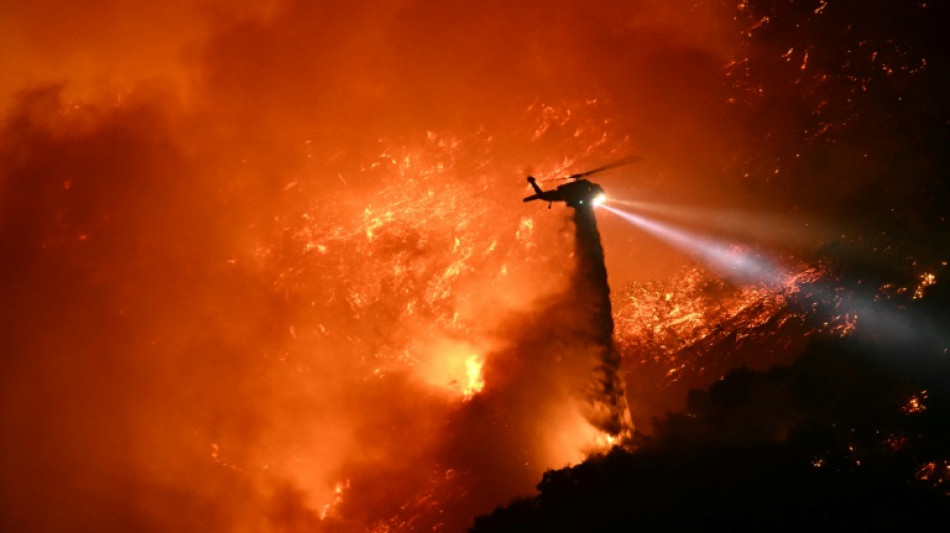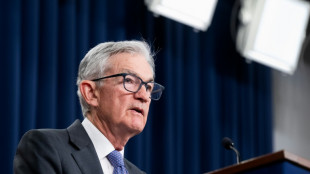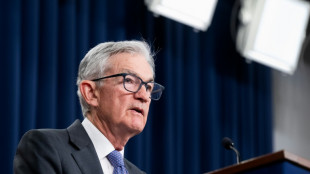
-
 Kyiv buries medic killed in Russian drone strike
Kyiv buries medic killed in Russian drone strike
-
Israel revokes French researcher's travel permit

-
 India and Germany seek to boost defence industry ties
India and Germany seek to boost defence industry ties
-
French coach and football pundit Rolland Courbis dies at 72

-
 UK regulator opens probe into X over sexualised AI imagery
UK regulator opens probe into X over sexualised AI imagery
-
AFCON organisers investigate incidents after Algeria-Nigeria clash

-
 US Fed chief warns of 'intimidation' after criminal subpoenas
US Fed chief warns of 'intimidation' after criminal subpoenas
-
Gold hits record high, dollar falls as US targets Fed

-
 Iran says 'prepared for war' as alarm grows over protest toll
Iran says 'prepared for war' as alarm grows over protest toll
-
India and Germany eye defence industry boost to ties

-
 'I know the pain': ex-refugee takes over as UNHCR chief
'I know the pain': ex-refugee takes over as UNHCR chief
-
US prosecutors open criminal probe into Federal Reserve

-
 Rohingya 'targeted for destruction' by Myanmar, ICJ hears
Rohingya 'targeted for destruction' by Myanmar, ICJ hears
-
'Genius' chimpanzee Ai dies in Japan at 49

-
 Trump says US will take Greenland 'one way or the other'
Trump says US will take Greenland 'one way or the other'
-
Asian equities, precious metals surge as US Justice Dept targets Fed

-
 Myanmar pro-military party claims Suu Kyi's seat in junta-run poll
Myanmar pro-military party claims Suu Kyi's seat in junta-run poll
-
Fed chair Powell says targeted by federal probe

-
 Trailblazing Milos Raonic retires from tennis
Trailblazing Milos Raonic retires from tennis
-
Australia recalls parliament early to pass hate speech, gun laws

-
 'One Battle After Another,' 'Hamnet' triumph at Golden Globes
'One Battle After Another,' 'Hamnet' triumph at Golden Globes
-
Japan aims to dig deep-sea rare earths to reduce China dependence

-
 Top UN court to hear Rohingya genocide case against Myanmar
Top UN court to hear Rohingya genocide case against Myanmar
-
US sends more agents to Minneapolis despite furor over woman's killing

-
 Trump says Iran 'want to negotiate' after reports of hundreds killed in protests
Trump says Iran 'want to negotiate' after reports of hundreds killed in protests
-
Bangladesh's powerful Islamists prepare for elections

-
 NBA-best Thunder beat the Heat as T-Wolves edge Spurs
NBA-best Thunder beat the Heat as T-Wolves edge Spurs
-
Ukraine's Kostyuk defends 'conscious choice' to speak out about war

-
 Trump says working well with Venezuela's new leaders, open to meeting
Trump says working well with Venezuela's new leaders, open to meeting
-
Asian equities edge up, dollar slides as US Fed Reserve subpoenaed

-
 Hong Kong court hears sentencing arguments for Jimmy Lai
Hong Kong court hears sentencing arguments for Jimmy Lai
-
Powell says Federal Reserve subpoenaed by US Justice Department

-
 Chalamet, 'One Battle' among winners at Golden Globes
Chalamet, 'One Battle' among winners at Golden Globes
-
Turning point? Canada's tumultuous relationship with China

-
 Eagles stunned by depleted 49ers, Allen leads Bills fightback
Eagles stunned by depleted 49ers, Allen leads Bills fightback
-
Globes red carpet: chic black, naked dresses and a bit of politics

-
 Maduro's fall raises Venezuelans' hopes for economic bounty
Maduro's fall raises Venezuelans' hopes for economic bounty
-
Golden Globes kick off with 'One Battle' among favorites

-
 Australian Open 'underdog' Medvedev says he will be hard to beat
Australian Open 'underdog' Medvedev says he will be hard to beat
-
In-form Bencic back in top 10 for first time since having baby

-
 Swiatek insists 'everything is fine' after back-to-back defeats
Swiatek insists 'everything is fine' after back-to-back defeats
-
Wildfires spread to 15,000 hectares in Argentine Patagonia

-
 Napoli stay in touch with leaders Inter thanks to talisman McTominay
Napoli stay in touch with leaders Inter thanks to talisman McTominay
-
Meta urges Australia to change teen social media ban

-
 Venezuelans await political prisoners' release after government vow
Venezuelans await political prisoners' release after government vow
-
Lens continue winning streak, Endrick opens Lyon account in French Cup

-
 McTominay double gives Napoli precious point at Serie A leaders Inter
McTominay double gives Napoli precious point at Serie A leaders Inter
-
Trump admin sends more agents to Minneapolis despite furor over woman's killing

-
 Allen magic leads Bills past Jaguars in playoff thriller
Allen magic leads Bills past Jaguars in playoff thriller
-
Barca edge Real Madrid in thrilling Spanish Super Cup final


January smashes heat record, surprising scientists
Last month was the hottest January on record, blitzing the previous high and stunning climate scientists who expected cooler La Nina conditions to finally start quelling a long-running heat streak.
The Copernicus Climate Change Service said January was 1.75C hotter than pre-industrial times, extending a persistent run of historic highs over 2023 and 2024, as human-caused greenhouse gas emissions heat the planet.
Climate scientists had expected this exceptional spell to subside after a warming El Nino event peaked in January 2024 and conditions gradually shifted to a cooling La Nina phase.
But the heat has lingered at record or near-record levels ever since, sparking debate among scientists about what other factors could be driving warming to the top end of expectations.
Scientists warn that every fraction of a degree of warming increases the intensity and frequency of extreme weather events like heatwaves, heavy rainfall and droughts.
January was 0.09C hotter than the previous high of January 2024 -- a "sizeable margin" in global temperature terms, said Julien Nicolas, a climate scientist from Copernicus.
"This is what makes it a bit of a surprise... you're not seeing this cooling effect, or temporary brake at least, on the global temperature that we were expecting to see," he told AFP.
Stefan Rahmstorf, from the University of Potsdam, said it was the first time that temperatures recorded during a La Nina period were above those of a preceding El Nino.
"This is of serious concern -- over the past sixty years, all twenty five La Nina January's have been cooler than surrounding years," he said.
- Weak La Nina -
This year La Nina is expected to be weak and Copernicus said prevailing temperatures in parts of the equatorial Pacific Ocean suggested "a slowing or stalling of the move towards" the cooling phenomenon.
Nicolas said it could disappear completely by March.
Last month, Copernicus said that global temperatures averaged across 2023 and 2024 had exceeded 1.5 degrees Celsius for the first time.
This did not constitute a permanent breach of the long-term 1.5C warming target under the Paris climate accord -- but was a clear sign that the limit was being tested.
Overall, 2025 is not expected to follow 2023 and 2024 into the history books: scientists predict it will rank as the third hottest year yet.
Copernicus said it would be closely monitoring ocean temperatures throughout 2025 for hints about how the climate might behave.
Oceans are a vital climate regulator and carbon sink, and cooler waters can absorb greater amounts of heat from the atmosphere, helping to lower air temperatures.
They also store 90 percent of the excess heat trapped by humanity's release of greenhouse gases.
"This heat is bound to resurface periodically," said Nicolas.
"I think that's also one of the questions -- is this what has been happening over the past couple of years?"
Sea surface temperatures have been exceptionally warm over 2023 and 2024, and Copernicus said readings in January were the second highest on record.
"That is the thing that is a little puzzling -- why they remain so warm," Nicolas said.
- Open questions -
Bill McGuire, a climate scientist from University College London, said it was "astonishing and frankly terrifying" that January remained at record highs despite La Nina emerging.
Joel Hirschi, from the UK's National Oceanography Centre, cautioned against reading too much into a single month's data, saying record warmth had been observed following El Nino phases even after the onset of La Nina.
Scientists are unanimous that burning fossil fuels has largely driven long-term global warming, and that natural climate variability can also influence temperatures from one year to the next.
But natural warming cycles like El Nino could not alone explain what had taken place in the atmosphere and seas, and answers were being sought elsewhere.
One theory is that a global shift to cleaner shipping fuels in 2020 accelerated warming by reducing sulphur emissions that make clouds more mirror-like and reflective of sunlight.
In December, a peer-reviewed paper looked at whether a reduction in low-lying clouds had let more heat reach Earth's surface.
"These are avenues that must be taken seriously, and remain open," Robert Vautard, a leading scientist with the UN's climate expert panel IPCC, told AFP.
The EU monitor uses billions of measurements from satellites, ships, aircraft and weather stations to aid its climate calculations.
Its records go back to 1940, but other sources of climate data -- such as ice cores, tree rings and coral skeletons -- allow scientists to expand their conclusions using evidence from much further in the past.
Scientists say the current period is likely the warmest the Earth has been for the last 125,000 years.
P.Tamimi--SF-PST



